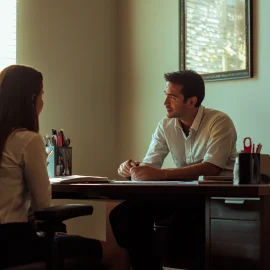

This article is an excerpt from the Shortform book guide to "Eight Dates" by John Gottman, Julie Schwartz Gottman, et al.. Shortform has the world's best summaries and analyses of books you should be reading.
Like this article? Sign up for a free trial here.
Do you and your partner have frequent disagreements? How do you practice conflict resolution in relationships?
Couples disagree on things all the time, but some relationships fall apart because of disagreements. To ensure this doesn’t happen to you, you need to practice conflict resolution with your partner.
Let’s look at the healthiest way to resolve conflict in a relationship.
Solving Disagreements
The authors of Eight Dates emphasize that disagreements in a relationship are normal. In fact, when you know how to manage disagreements effectively, it can even strengthen your relationship. The goal of this date is to learn how your partner manages disagreements and how conflict resolution in relationships is helpful.
(Shortform note: Not only do all couples fight, but common sources of conflict also cut across multiple cultures. For example, a study of over 2,000 married couples from Britain, China, Russia, Turkey, and the US found that couples were most likely to fight about the division of household tasks, finances, parenting, and physical intimacy.)
The authors differentiate between two types of problems that cause tension in a relationship. The first type of problem are those that can be resolved. These are often surface-level problems about what to eat for dinner or who should walk the dog. They’re only about the topic at hand and don’t hide any bigger underlying issues. The second type of problem is one that will never be resolved (what the authors call “perpetual problems”). These problems are rooted in core differences between you and your partner based on your values or life experiences. Research has shown that most conflicts fall into this second category.
(Shortform note: Both types of problems are worth addressing. Failing to deal with conflict will cause resentment to build up over time. According to some psychologists, harboring resentment, also called gunnysacking, is one of the main relationship killers. If you don’t address the issues in your “gunny sack,” your resentment can explode into an emotional outburst that causes lasting damage to your relationship.)
Regardless of the type of disagreement you’re having, the key to a healthy relationship isn’t avoiding conflicts but resolving them effectively, meaning you approach each disagreement as an opportunity to increase your understanding of the other person—not as an opportunity to win.
| How to Diffuse Conflict Levine and Heller (Attached) outline four communication strategies you can use to handle everyday conflicts and disagreements in a way that will bring you closer. Show genuine concern for the other person’s feelings. Remember that a disagreement between partners isn’t a zero-sum game where one person wins and the other loses. Your happiness and your partner’s happiness are tied up together, so when both partners feel validated, both partners win. Keep the argument centered on the present issue. Don’t get sidetracked or expand the argument to include other issues. Avoid a full-blown venting session, and just address one conflict at a time. Be willing to take part in the discussion. Don’t disengage or withdraw. Both partners need to be willing to address the issue head-on so that it can be resolved in a mutually satisfactory way, even if it means some arguing along the way. Openly communicate your needs and feelings. No matter how long you’ve been with your partner, you can’t expect them to be a mind reader. Tell them what you need and want clearly and directly. |
- What did you learn about conflict or managing conflict growing up? How have you navigated conflict in the past?
- What are your beliefs about anger? What do you need when you’re feeling angry?
- How would you like to manage conflict differently in the future?
| How Your Relationship to Conflict Forms To successfully discuss conflict with your partner, it’s helpful to have an understanding of your own relationship to conflict. A number of studies have found that the ways in which a child’s family of origin responds to conflict can influence how the developing child will behave toward conflict. For example, if a child witnesses their parents expressing hostile remarks to one another or if one parent continually avoids any discussion regarding disagreements, the child may engage in similar conflict strategies in their relationships as they age. People’s relationship to conflict may also vary depending on their cultural background. In The Culture Map, Erin Meyer identifies two types of orientations to conflict: open disagreement and disagreement-avoidant. She argues that people raised in (typically Western) open disagreement cultures are more likely to view disagreement as productive and positive and be willing to disagree openly, but people raised in (typically Eastern) disagreement-avoidant cultures are more likely to believe that openly disagreeing with someone might harm the relationship.) |

———End of Preview———
Like what you just read? Read the rest of the world's best book summary and analysis of John Gottman, Julie Schwartz Gottman, et al.'s "Eight Dates" at Shortform.
Here's what you'll find in our full Eight Dates summary:
- The secret to a strong, long-lasting relationship
- Why you and your partner need to make time for weekly dates
- The eight powerful dates and conversations to have at the start of a relationship






